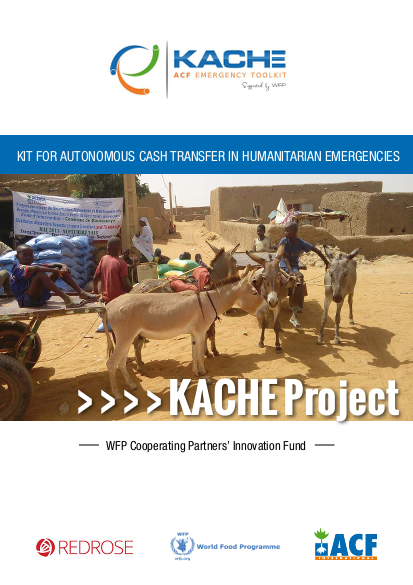
The present document reports the development of the Kit for Autonomous Cash transfer in Humanitarian Emergencies (KACHE), built upon Red Rose ONE system© supported by the WFP’s Cooperating Partners’ Innovation Fund (CPIF). The project started on August, 2014 and ended on December, 30th, 2015. KACHE project offers standardized functionalities/features that can adapt to all types of delivery mechanisms to overcome operational challenges that ACF operations confront in Cash Based Interventions. The project went through the following four phases (i) Project Launching: ACF launched a project Steering Committee (ii) Kit development: This phase involved the development of the e-transfer kit as a beta version including all pre-defined requirements (iii) Field test: this stage comprised training and field testing the kit in a real-life scenario. It was tested in Mali, Gao during a World Food Programme and ACF e-voucher distribution to 724 families (iv) Ready to use: The last stage was to have a ready to use kit for emergency deployment, including Standard Operating Plans. This project culminated generating stand by capacities as part of the emergency preparedness component of the toolkit.
Final results showed that the 5 functional design´s performance indicators – i) Ease of Use, ii) Speed, iii) Security, iv) Autonomy and v) Reliability- have been achieved to various extents. 96% of the functionalities required during the kit design were developed working together with Red Rose ©. Crucially, the emergency response teams have now a pre-stocked reliable cash transfer kit that can be deployed rapidly where appropriate and feasible, even in absence of basic infrastructures. ACF has delineated a scaling up plan in order to ensure that KACHE´s functionalities become available broadly to achieve higher level of effectiveness and accountability in every operation. During 2016, KACHE project will be available to support ACF´s operations aiming at reaching more people, faster to maximize the impact of each euro delivered to assist affected population during humanitarian emergencies.